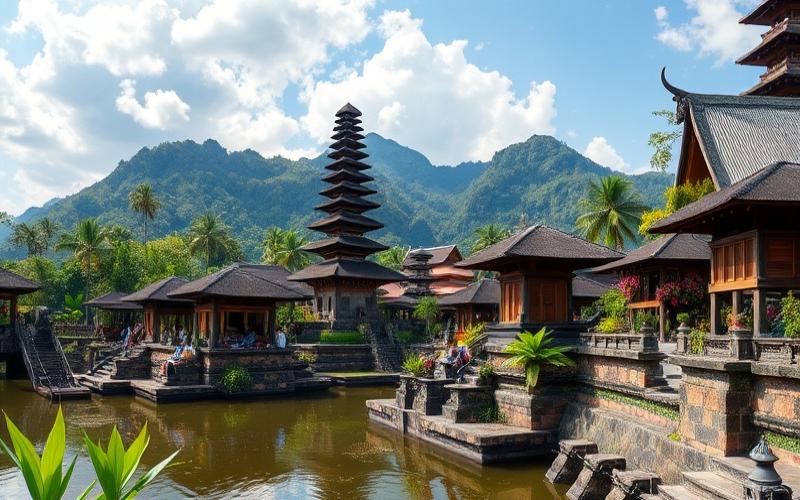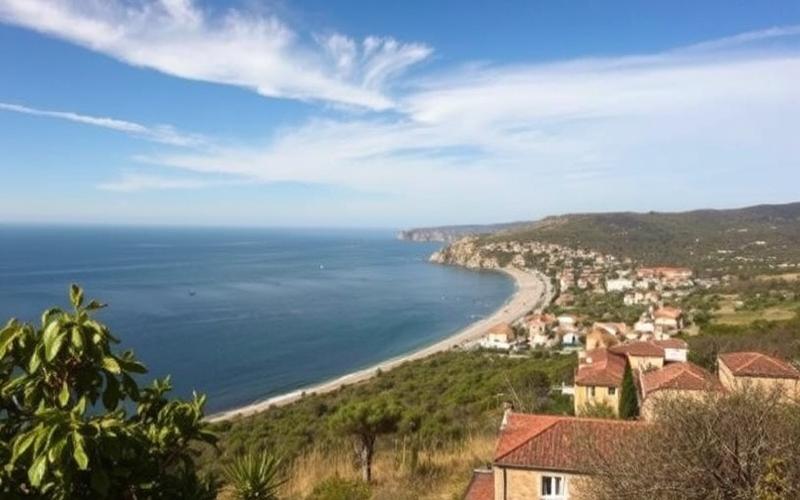
 Published on and written by Cyril Jarnias
Published on and written by Cyril Jarnias
The Island of the Gods continues to captivate investors worldwide. With its idyllic setting, rich culture, and dynamic real estate market, Bali stands out as a premier destination for those looking to diversify their international property portfolio. In 2025, Bali’s market trends offer enticing opportunities for savvy investors. Let’s dive into the details of this thriving market.
Bali Real Estate Hotspots: Where to Invest in 2025?
Bali’s real estate market is far from uniform. Certain areas stand out for their appeal and growth potential. In 2025, savvy investors would do well to focus on these trending sectors.
Canggu: Bali’s New Gem
Once a small surfers’ village, Canggu has transformed into a trendy destination attracting digital nomads and investors from around the globe. With its hip cafes, coworking spaces, and dream beaches, Canggu offers a modern lifestyle while maintaining a laid-back atmosphere. Modern villas with private pools are particularly sought after, showing attractive rental yields thanks to sustained tourist demand.
Ubud: Cultural and Natural Appeal
In the heart of the island, Ubud charms with its serene ambiance and rich cultural heritage. Investors find unique opportunities here, particularly in properties offering breathtaking views of terraced rice fields. Yoga retreats and luxury villas with traditional Balinese design are increasingly successful, attracting clients seeking authenticity and wellness.
Uluwatu: Cliffside Luxury
On the Bukit Peninsula, Uluwatu is establishing itself as Bali’s new high-end destination. Luxury villas overlooking the Indian Ocean offer exceptional investment prospects. With the opening of world-renowned hotel complexes, the area attracts affluent clientele, promising some of the island’s highest rental yields.
Good to Know:
In 2025, Canggu, Ubud, and Uluwatu stand out as the most promising areas for real estate investment in Bali. Each offers a unique profile suited to different types of investors and potential tenants.
Price Evolution: Sustained but Controlled Growth
Bali’s real estate market has experienced steady growth for several years, and 2025 is no exception to this trend. However, this price increase remains measured, still offering great opportunities for investors.
Constant Appreciation
- Continuously rising tourist demand
- Influx of digital nomads and expatriates choosing Bali as their residence
- Government investments in infrastructure, particularly Bali’s international airport and road network
Regional Disparities
While the overall trend is upward, there are significant variations between different regions of the island. For example, Canggu and Uluwatu are experiencing the most marked increases, with prices sometimes doubling within five years. Conversely, more established areas like Seminyak show more moderate growth, around 5 to 8% annually.
A Market Still Affordable Compared to Other Destinations
Despite this continuous rise, Bali’s real estate prices remain attractive compared to other luxury tourist destinations. In 2025, it’s still possible to acquire a modern villa with a pool for a budget between $220,000 and $550,000, depending on location and amenities. This relative accessibility helps maintain Bali’s appeal to international investors.
Good to Know:
In 2025, Bali’s real estate market is experiencing average annual growth of 10 to 15%, with regional variations. Despite this increase, prices remain competitive compared to other luxury destinations, still offering excellent investment opportunities.
Preferred Property Types: Betting on the Balinese Experience
To maximize their investment potential in Bali, buyers should target the most sought-after property types. In 2025, certain properties stand out particularly for their appeal to tenants and their yield potential.
Villas with Private Pools: The Must-Have
Individual villas with private pools remain the flagship product of Bali’s real estate market. These properties, typically comprising 2 to 4 bedrooms, offer the privacy and luxury sought by high-end tourists and expatriates. In 2025, demand for this type of property remains strong, ensuring high occupancy rates and attractive rental yields, often exceeding 8% annually.
Villa Complexes: Simplified Management
For investors seeking easier management, professionally managed villa complexes are gaining popularity. These developments offer hotel services while preserving the privacy of a private villa. They particularly appeal to families and groups of friends on vacation. The advantage for investors lies in shared management costs and easier marketing through on-site teams.
Eco-Friendly Properties: A Strong Trend
In 2025, travelers’ environmental awareness is reflected in their accommodation choices. Villas built with sustainable materials, incorporating solar energy systems or rainwater harvesting, are increasingly successful. These “green” properties not only reduce operating costs but also attract clients willing to pay a premium for environmentally friendly stays.
Wellness Retreats: A Lucrative Niche Market
With the rise of wellness tourism, properties designed to host yoga retreats, meditation sessions, or detox stays represent an interesting investment opportunity. These properties, often located in peaceful areas like Ubud, can generate substantial revenue through high rates and loyal clientele.
Good to Know:
In 2025, Bali investors should prioritize villas with private pools, managed complexes, eco-friendly properties, and wellness retreats. These property types offer the best yield potential and meet the expectations of a demanding and diverse clientele.
Challenges and Opportunities in Bali’s 2025 Market
Investing in Bali in 2025 presents its share of challenges, but also unique opportunities. Understanding these issues is crucial for successful investment on the Island of the Gods.
Legal Framework: Evolution Favorable to Foreign Investors
One of the main challenges for foreign investors in Bali has long been the complex legal framework of property ownership. However, by 2025, the situation has significantly improved. The Indonesian government has relaxed regulations, now allowing foreigners to acquire properties with full ownership rights in certain designated areas. This evolution opens new perspectives for international investors, further securing their long-term investments.
Remote Management: Innovative Solutions
For investors not residing in Bali, remote property management might seem challenging. Fortunately, the local ecosystem has adapted to this demand. In 2025, numerous property management companies offer comprehensive services, ranging from maintenance to marketing, including booking management. These companies use advanced technologies allowing owners to track their investment performance in real time, wherever they are in the world.
Growing Competition: Standing Out to Succeed
With Bali’s growing appeal to international investors, competition is intensifying. To stand out, it becomes crucial to offer a unique experience to tenants. Properties offering personalized services, exceptional design, or privileged locations have a definite advantage. Savvy investors bet on quality and originality to ensure their investment’s long-term success.
Sustainable Development: An Opportunity to Seize
Faced with growing environmental concerns, sustainable development is becoming a major issue in Bali. Local authorities encourage environmentally friendly real estate projects. For investors, this is an opportunity to position themselves in an expanding market. Properties integrating ecological solutions, such as using local sustainable materials or renewable energy systems, benefit not only from a positive image but also from tax advantages in some cases.
Good to Know:
In 2025, Bali’s real estate market offers a more favorable legal framework for foreign investors, innovative solutions for remote management, and opportunities in sustainable development. The key to success lies in the ability to stand out in an increasingly competitive market.
Winning Investment Strategies for 2025
To make the most of Bali’s real estate market in 2025, it’s essential to adopt investment strategies adapted to local realities and emerging trends.
Portfolio Diversification
A winning approach involves diversifying your real estate portfolio in Bali. Rather than betting everything on a single property, savvy investors spread their assets across different property types and areas. For example, combining a luxury villa in Uluwatu for the high-end market with several apartments in Canggu for the digital nomad market can offer a balance between high yield and income stability.
Investment in Renovation and Improvement
In 2025, many older properties in Bali offer excellent value-added potential after renovation. Investing in improving these properties, adapting them to modern comfort standards while preserving their Balinese charm, can generate significant returns. This strategy also helps stand out in a market where new constructions are numerous.
Strategic Local Partnerships
Establishing strong partnerships with local players is crucial for success in Bali. Collaborating with Balinese architects, interior designers, and construction companies not only benefits from their local market expertise but also creates authentic and attractive properties for tenants. These partnerships can also facilitate navigating administrative and legal complexities.
Focus on Customer Experience
In 2025, customer experience is at the heart of success in Bali’s rental real estate. The investors who stand out are those who go beyond simply renting space. Offering personalized services, like private yoga classes, in-house chefs, or customized excursions, can justify higher rates and ensure better client retention.
Adoption of Smart Home Technologies
Integrating smart home technologies into Balinese properties is becoming a major asset. Remote control systems for air conditioning, lighting, and security not only improve tenant experience but also enable more efficient and economical property management. These installations can justify higher rental rates while reducing long-term operational costs.
Good to Know:
Winning strategies for investing in Bali in 2025 include portfolio diversification, investment in renovation, establishing local partnerships, focus on customer experience, and adoption of smart home technologies. These approaches help maximize returns and stand out in a competitive market.
Future Outlook: Bali in 2030 and Beyond
As we examine current trends in Bali’s real estate market in 2025, it’s also crucial to look ahead to anticipate long-term developments. What does the future hold for real estate investors in Bali?
Infrastructure Development
The Indonesian government has announced ambitious plans for Bali’s infrastructure development. By 2030, completion of a new public transport network is planned, including a light rail system connecting major tourist areas. These improvements should significantly increase property values located near new transport lines, offering strategic investment opportunities.
Emergence of New Development Areas
With the gradual saturation of traditionally popular areas like Seminyak or Canggu, new regions of Bali are beginning to attract investor attention. The island’s north, particularly around Lovina, and the east, toward Amed, are identified as the next frontiers of real estate development. These areas, still relatively preserved, offer significant growth potential for visionary investors.
Focus on Sustainable Development
Sustainability should become a central criterion in Bali’s real estate development. Faced with environmental challenges, local authorities are imposing stricter construction standards. Properties integrating advanced ecological solutions, like energy self-sufficiency or wastewater treatment, will not only comply with new regulations but also be more attractive to an increasingly environmentally conscious clientele.
Evolution of Investor and Tenant Profiles
By 2030, diversification of investor and tenant profiles in Bali is expected. With the rise of remote work, the island could become a major hub for technology companies and startups, attracting a new wave of long-term residents. This evolution could stimulate demand for innovative living and working spaces, opening new niches for real estate investors.
Advanced Technological Integration
The future of real estate in Bali will be marked by advanced technological integration. “Smart villas,” fully connected and manageable remotely, will become the norm. Using virtual reality for remote tours and artificial intelligence to optimize rental management will transform how properties are marketed and managed, offering new opportunities for tech-savvy investors.
Good to Know:
Future prospects for real estate in Bali are promising, with infrastructure development, emergence of new investment areas, increased focus on sustainability, evolution of investor and tenant profiles, and advanced technological integration. Investors who anticipate these trends will be best positioned to capitalize on tomorrow’s Balinese market.
In conclusion, Bali’s real estate market in 2025 offers a unique mix of opportunities and challenges. With sustained price growth, promising emerging areas, and consistently strong demand for quality properties, the Island of the Gods continues to attract investors worldwide. The key to success lies in a strategic approach, combining deep understanding of local trends with a long-term vision of the island’s development.
Investors who can navigate the complexities of the Balinese market, betting on quality, innovation, and sustainability, will be best positioned to profit from this dynamic market. Whether it’s a luxury villa in Uluwatu, an eco-complex in Ubud, or a modern apartment in Canggu, Bali continues to offer unique opportunities to diversify your real estate portfolio and generate attractive returns.
Disclaimer: The information provided on this website is for informational purposes only and does not constitute financial, legal, or professional advice. We encourage you to consult qualified experts before making any investment, real estate, or expatriation decisions. Although we strive to maintain up-to-date and accurate information, we do not guarantee the completeness, accuracy, or timeliness of the proposed content. As investment and expatriation involve risks, we disclaim any liability for potential losses or damages arising from the use of this site. Your use of this site confirms your acceptance of these terms and your understanding of the associated risks.















































